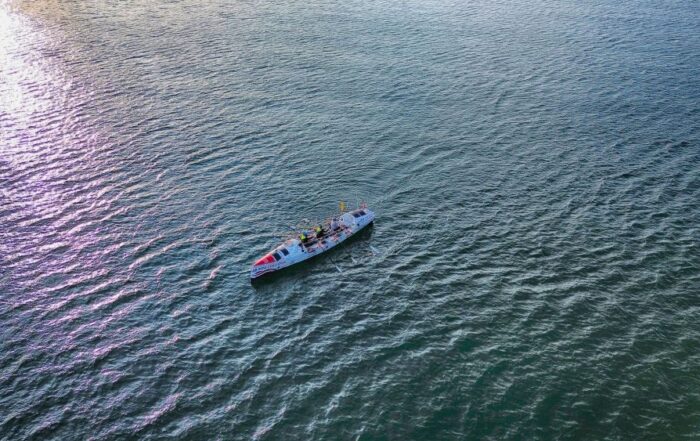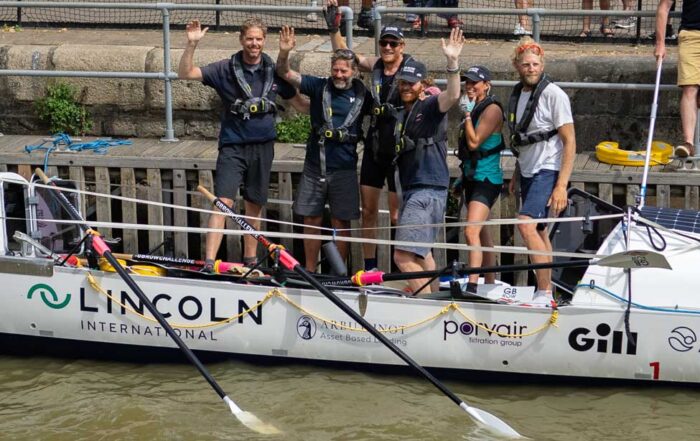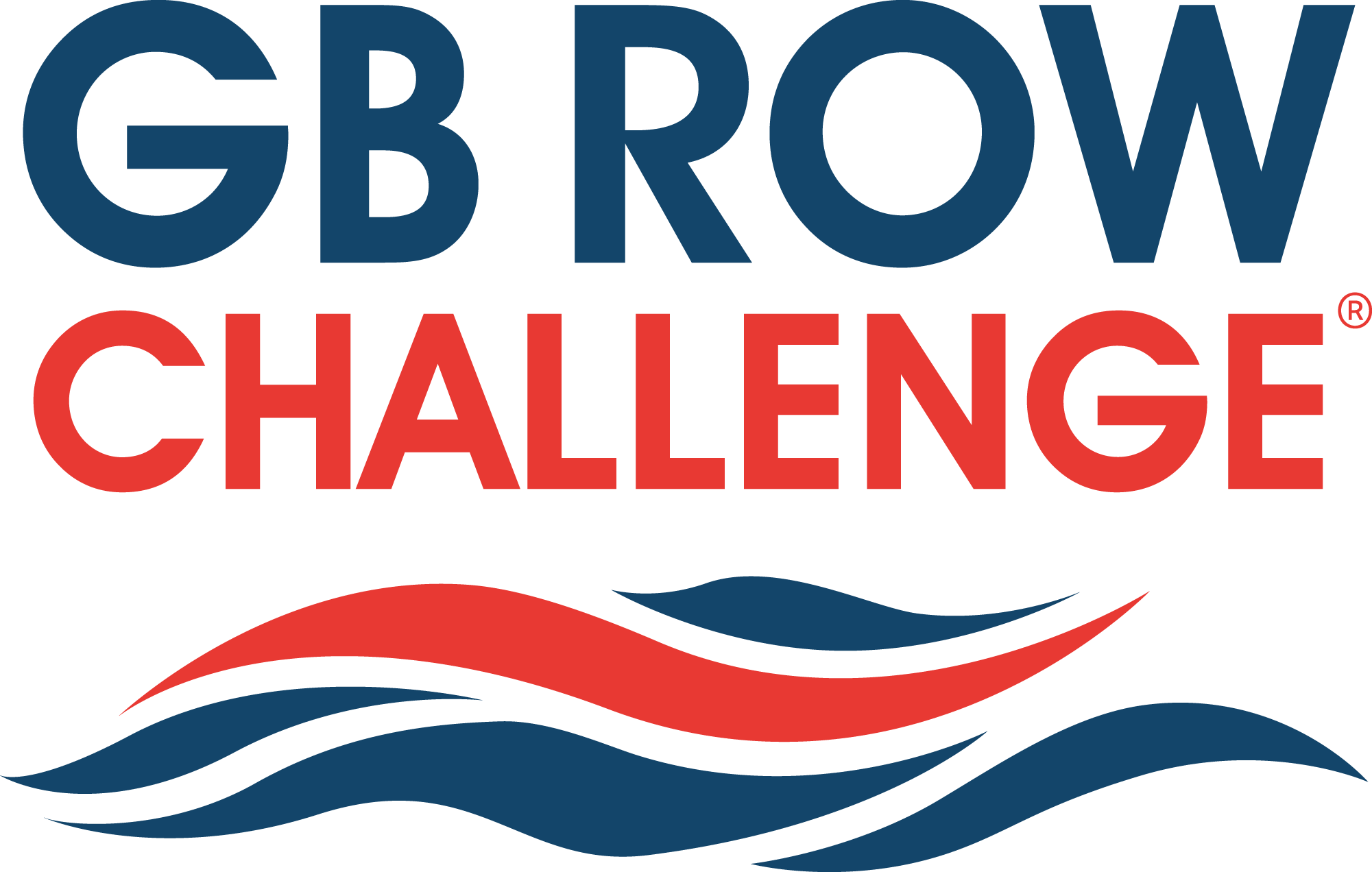Two teams of ocean rowers will set off on a 2,000 mile rowing challenge around the entire coast of Great Britain this weekend, and they’re both aiming for Guinness world records.
The crews of six will be competing in the GB Row Challenge, a sporting event with a powerful sustainable purpose: the rowers collaborate with scientists from the University of Portsmouth to collect data on microplastics, temperature, noise pollution, and biodiversity.
They depart from Tower Bridge, London at 17:00 on Sunday 9 June.
The Challenge is considered the world’s toughest rowing race as teams have to row continuously and unassisted while navigating complex tidal streams, shipping lanes and volatile weather.
 Team Sea Change. L-R: Laura Fantuzzi (who has been replaced by Madeline McSherry), Lorena Nichols, Chrissy Durkin, Aoife Luscombe, Jess Mc Iver, Dr Kat Bruce
Team Sea Change. L-R: Laura Fantuzzi (who has been replaced by Madeline McSherry), Lorena Nichols, Chrissy Durkin, Aoife Luscombe, Jess Mc Iver, Dr Kat Bruce
Determined to shine a global spotlight on the health of our coastal seas, team Sea Change is a group of female environmental professionals working in the fields of nature, climate and corporate sustainability.
If successful, they’ll be the third all-female crew to have ever completed this challenge. They are hoping to beat the Guinness World Record for fastest female team, which was set last year by Team Ithaca who spent 44 days, 20 hours, 19 minutes and 34 seconds circumnavigating Great Britain.
The team’s skipper, Dr Kat Bruce, is founder of NatureMetrics, a UK-based nature technology company that specialises in the use of environmental DNA to measure and monitor biodiversity. Kat is a keen rower and took part in GB Row Challenge 2022 in the only crew to complete the challenge that year.
She said: “It’s two years since I last competed in the GB Row Challenge and I’m excited to be getting back in the same boat! My team is made up of really inspiring women united by their commitment to marine conservation. We have an American, a Canadian, a South African and three Brits, so a truly international crew ready to take on the challenge.”
 Team Coastal Odyssey. L-R: Hannah Davies, Patrick Deacon, Daisy Lucker, Adam Ravenscroft, Lia Evans, Joe Benson
Team Coastal Odyssey. L-R: Hannah Davies, Patrick Deacon, Daisy Lucker, Adam Ravenscroft, Lia Evans, Joe Benson
Team Coastal Odyssey is a diverse group of adventurers united by their love for the sea and a shared goal of pushing their physical and mental boundaries. They are also keen to raise awareness about ocean health and hope to get the record for the first and fastest mixed crew to row unsupported around the British mainland.
Patrick Deacon is the Skipper of Coastal Odyssey. He said: “I grew up in the middle of England, in Leicestershire – about as far away from the sea as you can possibly be in the UK! And I’ve never rowed before, which makes this quite the adventure, which is exactly what I was looking for to celebrate my 40th year on this planet.
“My interest, love and respect for the ocean was sparked by taking part in a British-led climbing expedition by sailboat to put up new rock climbing routes in Western Greenland. I decided I wanted to spend more time on the water and the GB Row challenge seemed like the perfect combination of an epic challenge and ocean conservation research. I’m very proud to be taking part.”
As they row, the teams will collect vital data on ocean health and pollution levels, which will be analysed by scientists. This data will contribute to ongoing research efforts aimed at understanding the impacts of human activity on marine ecosystems and informing strategies for conservation and sustainability.
Professor Fay Couceiro, expert in biogeochemistry and environmental pollution at the University of Portsmouth and lead scientist for GB Row Challenge, said: “It’s amazing to have people willing to take on a gruelling physical challenge, which has such an important scientific purpose. The data they gather on the state of our oceans is vital to build a comprehensive map showing the environmental challenges our coastal seas are facing.
It’s amazing to have people willing to take on a gruelling physical challenge, which has such an important scientific purpose.
-Fay Couceiro, Professor of Environmental Pollution
“We’ve recently released an initial report on the biodiversity data collected by the team who completed the challenge last year, which gives us one of the most detailed baselines of British coastal biodiversity for fish, mammals and birds using environmental DNA analysis.
“By combining this data with the temperature, microplastic and underwater noise data, we can identify trends and track changes in environmental data over time, which we hope will drive informed decision-making for a more sustainable future.”
GB Row Challenge founder, William de Laszlo, said: “I’m excited to follow the journeys of both teams in this year’s GB Row Challenge, and thank them for their commitment to collecting this important data, which will shed light on the health of our precious oceans.”
Share This Story, Choose Your Platform!
Recent Posts
Study reveals how much UK seas have warmed in a year
UK seas were, on average, 0.39°C warmer in 2023 compared to 2022, a report by the University of Portsmouth and GB Row Challenge has found. Some regions, including the Celtic and Irish Seas and the northern North [...]
How Extreme Rowing Challenge Is Tackling Ocean Pollution
Tackling ocean pollution is one of the biggest environmental challenges of our time. Extreme rowing challenges are now playing a vital role in tackling ocean polluting by gathering valuable data, raising awareness, and inspiring action. [...]





